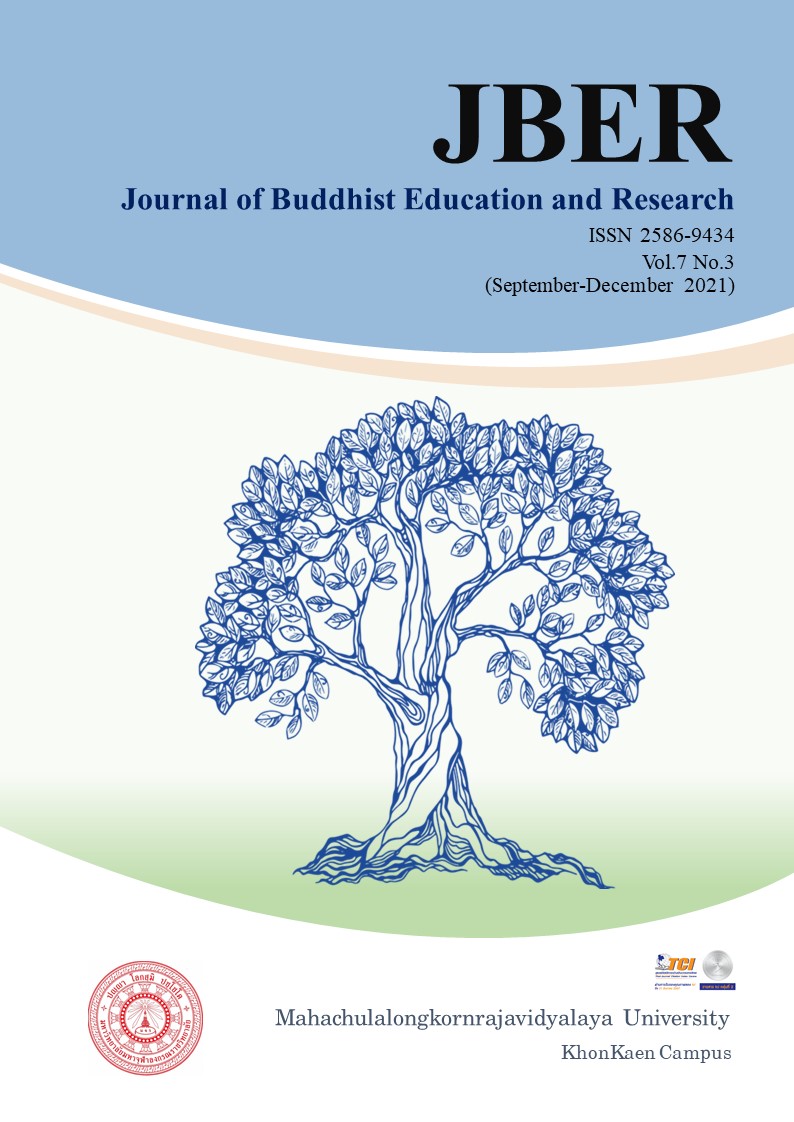THE EFFECTS OF SITUATION FOR PROCESSING AND AN PROBLM SOVING ABILITY ACHIEVMENT IN ECONOMIC STROND MATHAYOMSUKSA 2 STUDENTS
Keywords:
Situation for Processing; Problem solving AbilityAbstract
The objectives of this research were : to compare academic achievements, learning materials, economics and problem-solving abilities for Mathyomsuksa 2 students before and after, learning through normal processes and situations and teaching methods, and to compare the achievements of secondary school economics learning materials learned by the process of facing the situation with regular teaching methods, and to compare problem-solving capabilities between Mathyomsuksa 2 students, studying with the process of dealing with the situation with the teaching method. The sample was Mathyomsuksa 2 students for the second semester of the academic year 2020. The 40-person room was obtained from a group sampling using two groups of quiz research schemes. The tools used to collect data include learning management plans with situational processes. Achievement Test Quiz Statistics used to analyze data include percentage, average, standard deviation, and independent testing.
The results showed that:
- Achievements in economics learning materials for Mathyomsuksa 2 students learned with the process of facing the situation is statistically significantly higher than before class at .05.
- Achievements in economics learning for Mathyomsuksa 2 students: Learned with regular teaching methods after higher education than before class. Statistically significant at .05 level
- Achievements in economics learning materials for Mathyomsuksa 2 students of learning is handled by the process of facing the situation, unlike the normal teaching method at a statistically significant .05 level.
References
กรมวิชาการ. (2545). พระราชบัญญัติการศึกษาแห่งชาติ พ.ศ. 2542 และที่แก้ไขเพิ่มเติม(ฉบับที่ 2) พ.ศ. 2545. กรุงเทพฯ: โรงพิมพ์องค์การรับส่งสินค้าและพัสดุภัณฑ์.
กระทรวงศึกษาธิการ. (2551). หลักสูตรแกนกลางการศึกษาขั้นพื้นฐาน พุทธศักราช 2551. กรุงเทพฯ: โรงพิมพ์สหกรณ์การเกษตรแห่งประเทศไทย จำกัด.
จิราพร โบสิทธิพิเชฏฐ์. (2557). การพัฒนาผลสัมฤทธิ์ทางการเรียนและทักษะกระบวนการคิดแก้ปัญหา เรื่องสังคมไทยของนักเรียนระดับชั้นมัธยมศึกษาปีที่ 3 โดยใช้การจัดการเรียนรู้ด้วยกระบวนการเผชิญสถานการณ์. วิทยานิพนธ์ปริญญามหาบัณฑิต ภาควิชาหลักสูตรและวิธีการสอน สาขาการสอนสังคมศึกษา มหาวิทยาลัยศิลปากร.
ทิศนา แขมมณี. (2548). ศาสตร์การสอน. กรุงเทพฯ: จุฬาลงกรณ์มหาวิทยาลัย.
บัวภา คำกันยา. (2555). ผลการจัดการเรียนรู้โดยใช้ปัญหาเป็นฐานเสริมด้วยแผนผังความคิดที่มีต่อความสามารถในการคิดแก้ปัญหาและผลสัมฤทธิ์ทางการเรียนสาระเศรษฐศาสตร์ของนักเรียนชั้นประถมศึกษาปีที่ 3 . วิทยานิพนธ์ปริญญาครุศาสตร์มหาบัณฑิต สาขาหลักสูตรและการสอน มหาวิทยาลัยราชภัฎอุดรธานี.
ปนัดดา ราศรี. (2557). การพัฒนาผลสัมฤทธิ์ทางการเรียนและกระบวนการคิดอย่างมีวิจารณญาณของนักเรียนชั้นมัธยมศึกษาปีที่ 2 โดยใช้กระบวนการเผชิญสถานการณ์ ในรายวิชา ส 22101 สังคมศึกษา 3. วิทยานิพนธ์ศึกษาศาสตรมหาบัณฑิต มหาวิทยาลัยขอนแก่น.
ประพันธ์ศิริ สุเสารัจ. (2553). การพัฒนาการคิด. (พิมพ์ครั้งที่ 4). กรุงเทพฯ: 9119 เทคนิคพริ้นติ้ง.
โรงเรียนบ้านง่อนหนองพะเนาว์มิตรภาพที่ 126. (2559). รายงานการปฏิบัติงานของสถานศึกษา. สกลนคร: ฝ่ายวิชาการ.
ลาวัลย์ รักษาสัตย์. (2550). การพัฒนากระบวนการสอนรายวิชาวิทยาศาสตร์สิ่งแวดล้อมระดับชั้นมัธยมศึกษาตอนปลายเพื่อเสริมสร้างความสามารถในการตัดสินใจแก้ปัญหาสิ่งเวดล้อมด้วยเทคนิคการอนุรักษ์. ปริญญานิพนธ์การศึกษาดุษฎีบัณฑิต สาขาวิชามัธยมศึกษา: มหาวิทยาลัยศรีนครินทวิโรฒ.
สำนักงานเลขาธิการสภาการศึกษา. (2560). แนวทางการจัดการเรียนรู้ที่เน้นผู้เรียนเป็นสำคัญ การเรียนรู้ใช้ปัญหาเป็นฐาน. กรุงเทพฯ: โรงพิมพ์ชุมนุมการเกษตรแห่งประเทศไทย.
สุคนธ์ สินธพานนท์. (2552). สุดยอดวิธีการสอนสังคมศึกษา ศาสนา และวัฒนธรรม นำไปสู่การจัดการเรียนรู้ของครูยุคใหม่. กรุงเทพฯ: อักษรเจริญทัศน์.





